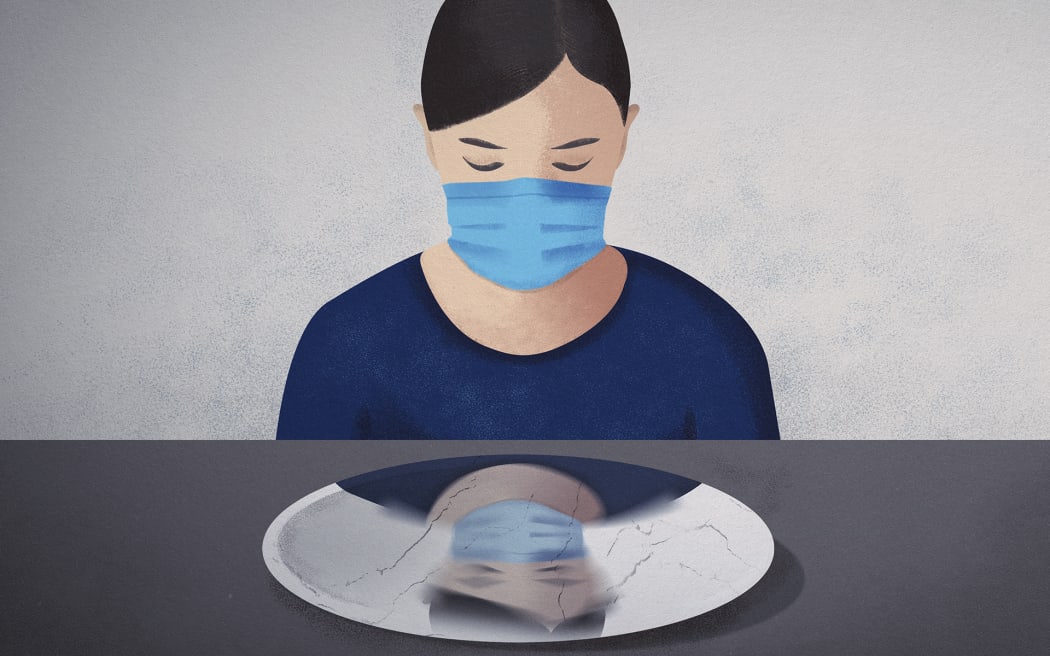Lockdown can be a very challenging time for the 100,000+ New Zealanders coping with an eating disorder.
Christchurch dietician Victoria Schönwald has 10 tips to keep moving forward with recovery.

Photo: RNZ/Vinay Ranchhod

Christchurch dietician Victoria Schönwald Photo: Victoria Schönwald / Twitter
Eating disorders thrive in isolation because they’re brain-based and fear-driven, Schönwald tells Jesse Mulligan.
"When people are stuck at home and not getting out there and living their full lives, the eating disorder can really take control and either trigger the disorder or make people relapse."
Breaking up the daily routine in little ways can be helpful for people stuck at home with a diagnosed eating disorder, she says.
"Don't stick to the same thing every day. Eating disorders love rigidity so the best way not to get stuck is to keep things different.
"Sometimes that can be mixing up small things, eating a different breakfast, or using a different cup or spoon, or not making your bed if you normally make your bed."
Celebrate the small wins too, she says. There's no need to go all out and try to take massive steps towards change every day.
If lockdown has put a halt to your work re-engaging with social eating, Schönwald recommends setting up Zoom dinner parties with friends.
"A lot of the time people with eating disorders don't like eating with people and that's one of the fears that drives the isolation.
"If somebody has started that step in their recovery, it'd be really challenging to be in a situation now [in lockdown], it'd feel like taking a step backwards.
"Even if it's having a glass of wine with your friends or some cheese and crackers, but anything that's to do with normalising the eating experience as much as possible in an unusual situation [helps]."
Prioritise eating breakfast because it becomes easier to skip other meals when you don't start the day with some food, Schönwald says.
"Even if you've never been a breakfast person before, we just know eating regularly is part of recovery and it's something you need to do for the rest of your life pretty much."
The traits that might have fuelled your eating disorder can be channelled into a new hobby that might help you cope with lockdown, she says.
"[These traits] can make you good at so many other things ... If you're a bit stuck on what to do, think about your values and where they come from, and base your hobbies around that so you might be able to find a new passion."
Learning to meditate is a handy skill for handling brain-based illnesses such as eating disorders, Schönwald says.
She reminds people that it's okay to take sideways steps in your recovery until you're ready to climb up the ladder and challenge yourself again.
"Challenging fear foods can be a lot harder when you're already struggling ... what you don't want is to make it so hard that you do relapse, so just treading water is fine."
If you can, shop for groceries when the supermarket is relatively quiet and you've got a list prepared, she says.
"Just [be] prepared for going at a time when you feel less anxiety."
Lockdown can be challenging in many ways for those recovering from eating disorders and their support people, Schönwald says.
"I'm really sorry that there's not enough help out there because it's a common illness with some devastating consequences. But I just want to say recovery is 100 percent possible and you don't have to live like that.
"I recovered from an eating disorder and I've got a good relationship with food and my body and have some good coping skills now.
"You've just got to keep trying to find what's going to work for you."
Schönwald's website has a list of helpful online resources. For information about finding an online support group she also recommends Kristie Amadio’s website.
Where to get help:
Need to Talk? Free call or text 1737 any time to speak to a trained counsellor, for any reason.
Lifeline: 0800 543 354 or text HELP to 4357
Suicide Crisis Helpline: 0508 828 865 / 0508 TAUTOKO (24/7). This is a service for people who may be thinking about suicide, or those who are concerned about family or friends.
Depression Helpline: 0800 111 757 (24/7) or text 4202
Samaritans: 0800 726 666 (24/7)
Youthline: 0800 376 633 (24/7) or free text 234 (8am-12am), or email talk@youthline.co.nz
What's Up: online chat (3pm-10pm) or 0800 WHATSUP / 0800 9428 787 helpline (12pm-10pm weekdays, 3pm-11pm weekends)
Kidsline (ages 5-18): 0800 543 754 (24/7)
Rural Support Trust Helpline: 0800 787 254
Healthline: 0800 611 116
Rainbow Youth: (09) 376 4155
If it is an emergency and you feel like you or someone else is at risk, call 111.

